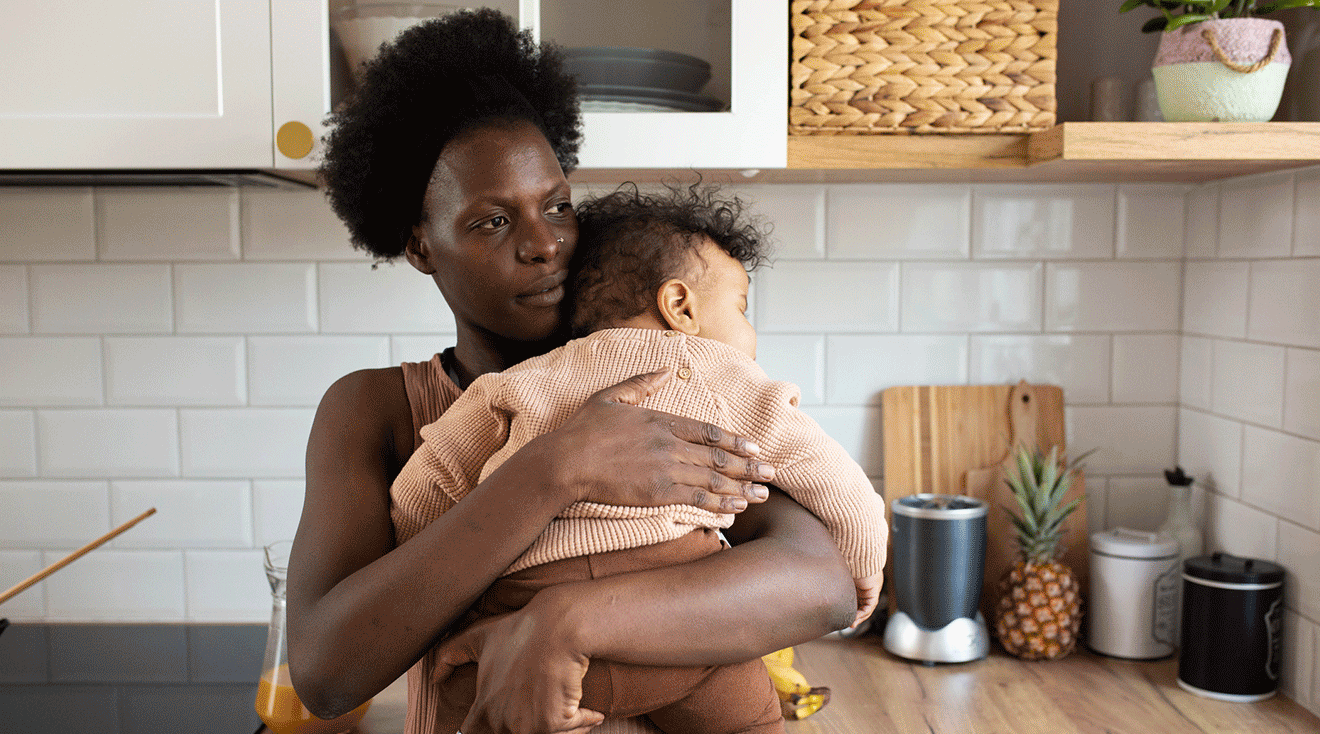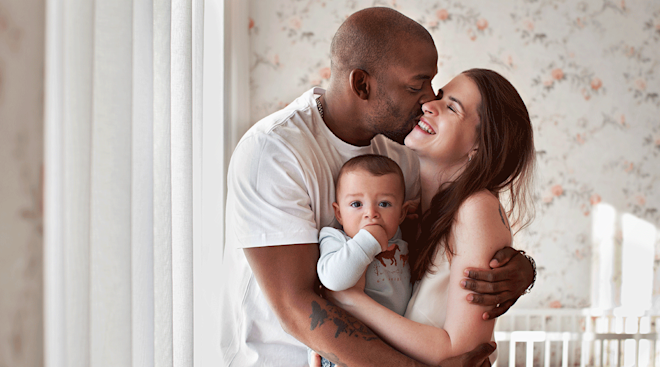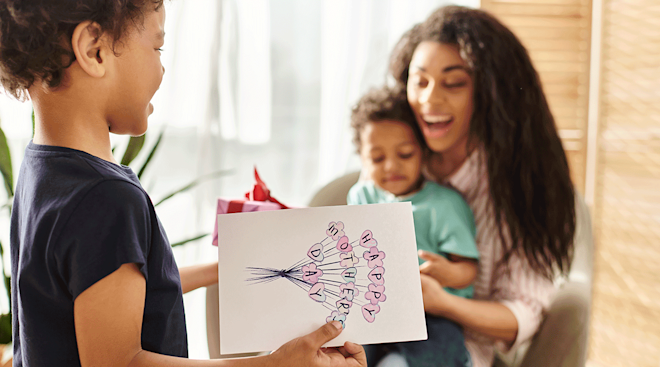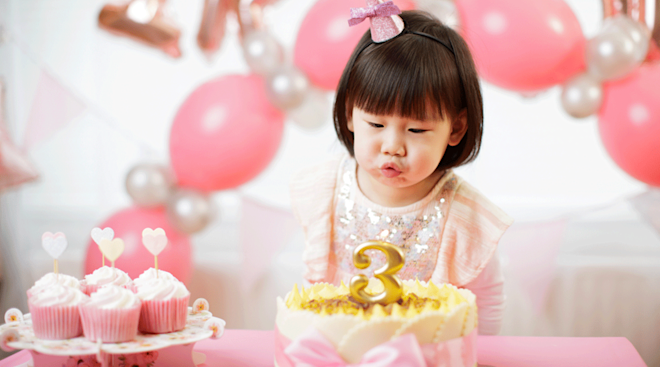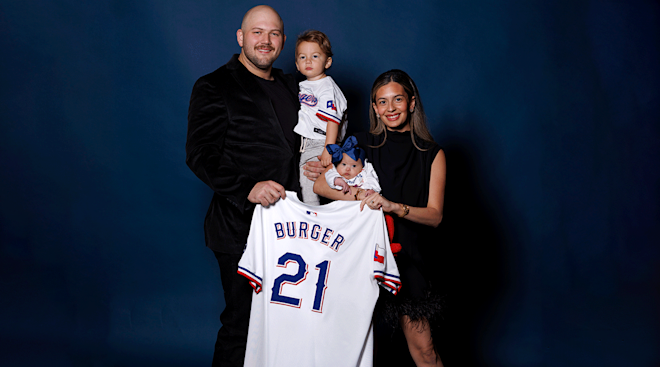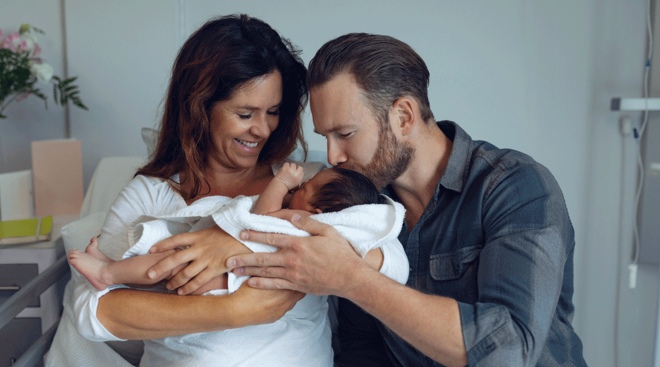How Black Parents Can Avoid the Trap of Toxic Positivity
It’s no secret that the transition to motherhood brings many contradicting emotions. Pregnancy symptoms, postpartum healing and adapting to taking care of baby all bring a complex mixture of highs and lows. But navigating these shifts as a Black woman adds another layer. Amid limited pregnancy and postpartum support, as well as bias in the healthcare system, Black moms are especially vulnerable to the pressure to exude positivity in a world that’s anything but.
Ashley Bonhomme, MS, PMH-C, a master’s level psychotherapist certified in perinatal mental health counseling, says that as somebody who wants to create a joyful experience for birthing people, she knows it can be tempting to lean into the trap of toxic positivity—but that it ultimately does more harm than good.
“It’s a natural human instinct to respond to a person’s pain by saying things that make them ‘feel good.’ But folks aren’t coming to therapy to be bombed with positive affirmations,” Bonhomme says. “It’s not effective, and it can actually have the opposite effect.”
At the same time, so much coverage of Black parents focuses on the maternal mortality crisis, while ignoring the joys of parenting. Black parents are left wanting to feel informed, empowered and hopeful while having the space to mourn the realities of today’s birthing climate. It’s a complex landscape to navigate.
Toxic positivity “occurs when encouraging statements are expected to minimize or eliminate painful emotions, creating pressure to be unrealistically optimistic without considering the circumstances of the situation,” notes the Anxiety and Depression Association of America (ADAA).
For Black moms, toxic positivity can often look like people telling them they’re strong, can survive and don’t need help, says Shenee Johnson, LPC, a licensed professional counselor and the founder and director of I Deserve Mental Wellness Services, a Georgia-based maternal healing collective specializing in Black pregnant and postpartum mental health. This pushes Black women further into the “superwoman schema,” she explains, which includes feeling “the obligation to present an image of strength and to suppress emotions; resistance to vulnerability or dependence on others; motivation to succeed despite limited resources; and prioritization of caregiving over self-care.”
There are some other common ways in which people might express toxic positivity toward Black moms. Johnson says that statements like, "all mothers in our family are strong; you’ll be just fine” or “postpartum depression wasn’t a thing in my day; just pray, and all will be okay,” set an unrealistic standard. Meanwhile, Bonhomme adds that family members and friends pointing out all of the things in your life you “should be grateful for” can feel out of touch. After all, you shouldn’t perpetually have to look on the bright side.
Toxic positivity can result in Black parents not seeking the mental health support they need. “The negative impacts include Black mothers being shamed into silence about their emotional pain and distress,” says Johnson. “They can be left isolated without the support their family needs.”
Bonhomme agrees: “The stigma associated with perinatal mood and anxiety disorders, coupled with the narratives around Black motherhood that measure our strength by the amount of pain we can bear without ‘complaint,’ already have the potential to deter those most in need from seeking help. Black women are asking to have our experiences affirmed.”
Black women are already disproportionately impacted by perinatal mental health conditions. Research notes that 40 percent of Black women experience maternal mental health symptoms, compared to one-fifth of new moms overall. Up to half of Black women don’t receive any mental health support or treatment.
Toxic positivity isn’t the only factor, of course. The pervasive negative framing of Black maternal health plays a role in the mental health of Black parents too. “Black women are already at risk for experiencing chronic stress as a result of race and gender-related oppression,” says Bonhomme. “Stress poses a risk for a birthing person’s reproductive health and has implications for our mental and emotional wellness. Hearing horror stories about preventable deaths of Black women and their babies can lead to intense fear and worry, and ultimately increase the risk for perinatal mood and anxiety disorders.”
If you feel pressured to be positive or somebody is invalidating your experiences, experts advise the following:
- Be clear about your needs. For example, state from the beginning that you’re looking for empathy, rather than advice.
- Be honest that some words aren’t helpful. If you’re comfortable having the conversation, let your loved one know what would be more helpful for you. With a coworker or an acquaintance, you may not want to engage with their toxic positivity at all.
- Let yourself feel your feelings. The ADAA suggests dealing with toxic positivity by trying to make room for thoughts and feelings even if they’re uncomfortable. Try not to tell yourself you “should” or “must” do anything: “Moving away from extreme positions to a place of balance improves our mental health and overall well-being.”
Bonhomme and Johnson agree that the disparities and negative framing surrounding Black motherhood can impact a person’s ability to experience joy. On one hand, having more information is a tool of empowerment; on the other, it can be extremely overwhelming. Bonhomme suggests using dialectical thinking, a skill that teaches us to honor and hold space for seemingly competing emotions to exist simultaneously.
“We can recognize the joy of holding and connecting with our baby one moment, while also speaking about the realities of sleep deprivation in those early postpartum weeks,” Bonhomme says. “By embracing both the joys and struggles of motherhood, we’re able to honor all aspects of one’s individual experience.”
The experts recommend the following to stay informed and empowered:
- Filter. Limit reading studies and statistics that only offer negative framing of Black maternal health. Instead, look for solution-focused resources that address disparities and include recommendations to help you feel empowered, like having a doula or support person present during birth, seeking out culturally responsive providers or preparing a list of concerns during initial appointments.
- Connect. Seek out culturally affirming birth stories like those from Birth Stories in Color, podcasts like Birthright that encourage joy and healing in birthing and Black-led pregnancy guides like Oh Sis, You’re Pregnant!: The Ultimate Guide to Black Pregnancy. Also, consider a birthing class or virtual mom support group.
- Prepare. Use resources like Postpartum Support International to learn the signs of perinatal mood and anxiety disorders. Talk with your loved ones to develop a support plan on what to do if something “seems off” or goes wrong.
- Self-attune. Observe how both overly negative and overly positive information on motherhood impacts your body and nervous system. Use feedback to decide what’s manageable, and create coping tools, like humming, belly-breathing, slow rocking or singing aloud to yourself. These can help you experience emotions instead of avoiding them.
When faced with toxic positivity, it’s important to communicate our needs and be honest about our feelings—with ourselves and others. Black moms deserve to express their feelings in their full complexity and find information that helps them feel safe and prepared while parenting. It’s also important to acknowledge that Black birthing people face risks and disparities when it comes to maternal health—allowing space to speak about these injustices and affirm that we deserve better is a part of healing. Lastly, don’t underestimate the value of rest: “Unplug, be present with your body and recognize the divinity and sacred nature of the journey you are on,” says Bonhomme.
Plus, more from The Bump:
Ashley Bonhomme, MS, PMH-C, CADC-II, is a master’s level psychotherapist certified in perinatal mental health counseling. She’s currently working with I Deserve Mental Wellness Services, a Georgia-based maternal healing collective specializing in Black pregnant and postpartum mental health. She holds a certification in addiction counseling and has served as a perinatal doula.
Shenee Johnson, LPC, is a licensed professional counselor and the founder and director of I Deserve Mental Wellness Services, a Georgia-based maternal healing collective specializing in Black pregnant and postpartum mental health.
Journal of Best Practices in Health Professions Diversity, Superwoman Schema, Stigma, Spirituality, and Culturally Sensitive Providers: Factors Influencing African American Women’s Use of Mental Health Services, Spring 2016
March of Dimes, Black Maternal Mental Health Week
Right as Rain (UW Medicine), What You Need to Know About Toxic Positivity, September 2021
Navigate forward to interact with the calendar and select a date. Press the question mark key to get the keyboard shortcuts for changing dates.

































